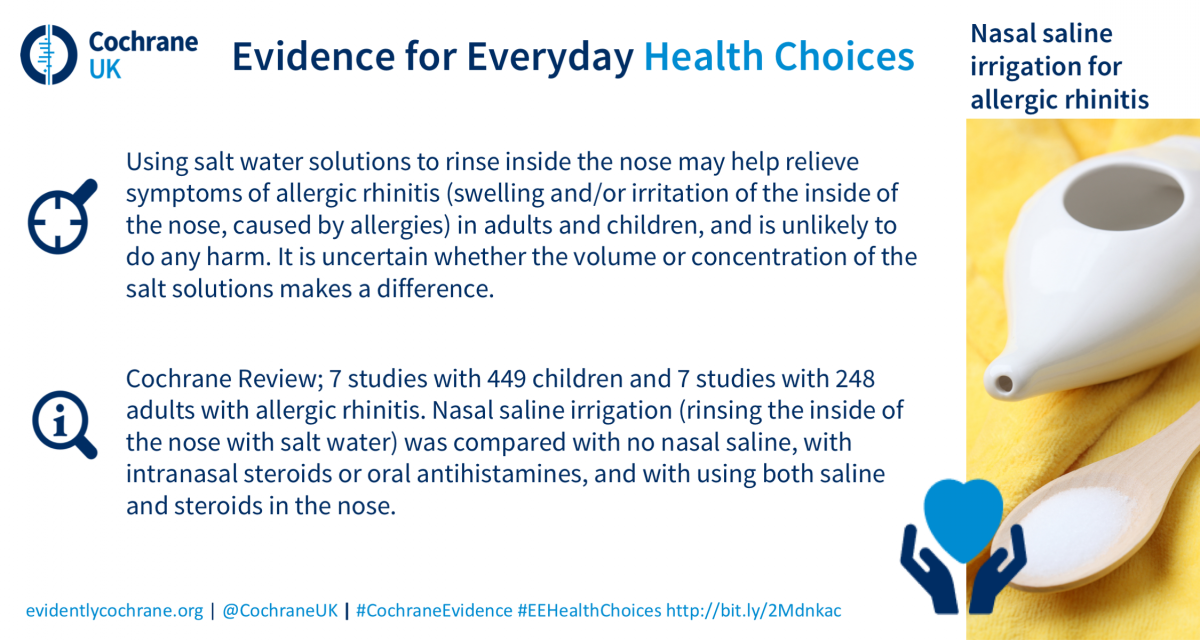
A team of review authors from the UK and Thailand worked with the Cochrane ENT Group to evaluate the benefits of nasal saline irrigation in people with allergic rhinitis.
Allergic rhinitis is inflammation (swelling and/or irritation) of the inside of the nose caused by allergies and is common in both children and adults. Common causes include grass or tree pollen, mould, dust mites or animal dander (tiny flakes of skin). People with allergic rhinitis experience symptoms (nasal obstruction, runny nose, nasal itching and sneezing) that may affect their quality of life.
Nasal saline irrigation (also known as nasal douche, wash or lavage) is a procedure that rinses the nasal cavity with saline (salt water) solutions. How saline works is not fully understood but it is probably through making the mucus (snot) thinner, making it easier to remove and also removing some of the allergens from the nose that cause irritation. Nasal saline irrigation can be performed with sprays, pumps or squirt bottles. Although saline irrigation is thought to be safe there have been reports of epistaxis (nosebleeds) and irritation or discomfort in the nose and ears. This therapy is available without prescription and can be used alone or as an add-on to other pharmacological treatment for allergic rhinitis, such as intranasal (in the nose) steroids and oral antihistamines).
Co-author of the review, Anna Schilder said, “The overall quality of evidence from this review was either low or very low because the studies were on the whole very small and measured the same outcome in various ways. Since saline irrigation could provide a cheap, safe and acceptable alternative to intranasal steroids and antihistamines we feel further high-quality studies are needed.”
The review included 14 studies with a total of 747 participants (260 adults; 487 children). With key results as follows:
Nasal saline irrigation compared with no saline irrigation
Nasal saline irrigation may have benefits in both adults and children in relieving the symptoms of allergic rhinitis compared to no saline irrigation and it is unlikely to be associated with adverse effects. It is not possible to tell from this review whether there is a difference between the different volumes and concentrations of saline solution.
Adding nasal saline irrigation onto 'pharmacological' allergic rhinitis treatment
It is uncertain whether adding nasal saline irrigation to pharmacological treatment (intranasal steroids or oral antihistamines) helps to improve the symptoms of allergic rhinitis compared to using pharmacological treatments alone. The use of nasal saline irrigation is unlikely to be associated with adverse effects.
Nasal saline irrigation compared to 'pharmacological' allergic rhinitis treatment
There is not enough evidence to know whether nasal saline irrigation is better, worse or the same as using intranasal steroids. No studies reporting the outcomes we were interested in compared nasal saline irrigation with oral antihistamines.

Dr Martin Burton, joint coordinating editor of the Cochrane ENT Group and an ear nose and throat doctor said in his Evidently Cochrane blog, “Allergic rhinitis can be seasonal (hay fever) or perennial (year-round allergies to things like house-dust mites); the symptoms can make people miserable. Many patients use steroid nasal sprays to help with their symptoms. Although the use of these is widespread, and the chance of having unpleasant side-effects is very low, many people would like to know if there is something a bit more natural that they can use, either instead of the steroids or in addition to them.”
- Read Dr Martin Burton’s blog 'Hay fever and dust-mite allergies: What are the health benefits of salty water for allergic rhinitis?' on Evidently Cochrane
- Read the full review
- Visit the Cochrane ENT website
Tuesday, August 14, 2018
